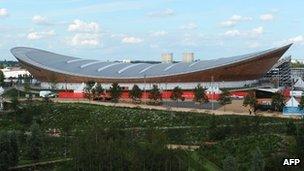London 2012: Olympic Games 'greenest ever'
- Published

Olympic venues, such as the Velodrome, were required to be made of at least a quarter recycled material
London 2012 has been the greenest Olympics ever, the commission set up to monitor the environmental impact of the Games has announced.
The independent Commission for a Sustainable London 2012 said recycling and regeneration had been a success.
But it said much more could be done to minimise the impact of future Olympic Games on people and the planet.
Commission chairman Shaun McCarthy said London had set high standards for future Olympic host cities to follow.
Transport success
Previous Olympics have been criticised for the environmental damage they caused through waste, construction and transport.
Sustainability was at the heart of London's bid for the Olympics and the commission said organisers had largely succeeded in achieving it.
For example, the venues were told to be made of at least a quarter recycled materials - that included using disused gas pipes in the Olympic Stadium.
The Olympic Park was praised for regenerating a derelict area and benefiting wildlife, and the commission said it was amazed by the success of public transport.
But it said the challenges for future host cities were off the Olympic site, including the social ethics of some of the manufacturers and sponsors associated with the Games.
'Cheerful volunteers'
Mr McCarthy said the use of temporary venues for the Games was "unprecedented".
And he hailed Stratford in east London, the site of the Olympic Park, as one of the best connected places in Europe after long-term investment in public transport infrastructure.
He said London 2012 was the world's first public transport Olympics "despite all the predictions of doom and gridlock".
Mr McCarthy said, external: "In the main, London's sustainable Games have been a massive success but like the best sports teams there is a need to continuously improve.
"I wish the IOC [International Olympics Committee] and future host cities success in proving they can do better."
He also said an increase in sports participation was likely to be short lived and it would take "investment in community and school sport and a clear plan to tackle the current obesity crisis".
He added: "The cheerful volunteers made the experience a joy. I even saw some people on the Tube talking to each other! Why can't it be like that all the time?"
- Published11 August 2012
- Published11 August 2012
- Published10 August 2012